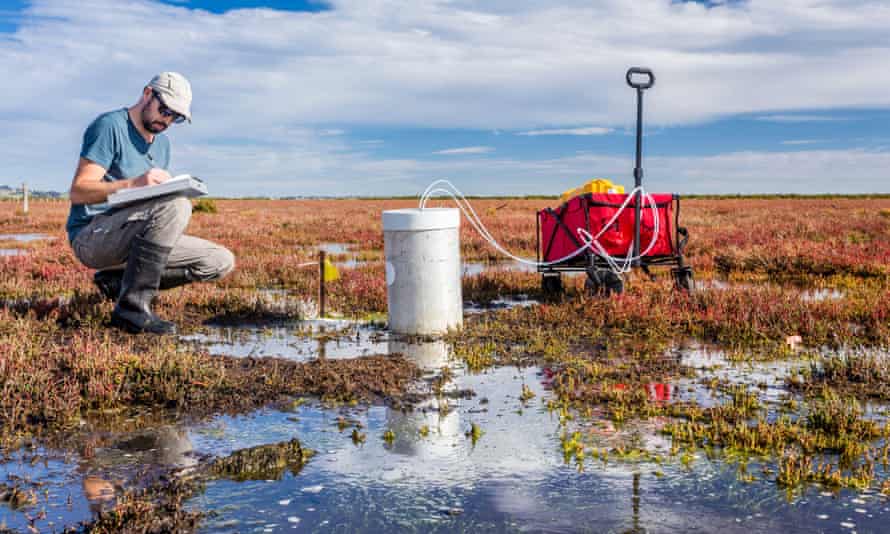Extract from The Guardian
I was taught to use my head, not my heart. But acknowledging sadness at what is lost can help us safeguard the future.

‘Bearing witness to the demise or death of what we love has started to look an awful lot like the job description for an environmental scientist these days.’ Scientist measuring greenhouse gas emissions at a wetland
Last modified on Thu 25 Mar 2021 06.36 AEDT
Over
the course of my career, the climate crisis has changed from something
only experts could see – reading clues trapped in frozen air bubbles or
statistical patterns in long-term data sets – to something that everyone
on Earth is living through. For me, it has gone from being something I
study to a way that I see the world and experience my life. It’s one
thing to publish a study
on the hypothetical impact of increasing temperature on California’s
people and ecosystems; it’s another to feel my stomach gripped by fear
as my parents flee a catastrophic California wildfire cranked up by longer, hotter, drier summers.
Bearing
witness to the demise or death of what we love has started to look an
awful lot like the job description for an environmental scientist these
days. Over dinner, my colleague Ola Olsson matter‑of‑factly summed up his career:
“Half the wildlife in Africa has died on my watch.” He studied
biodiversity because he loved animals and wanted to understand and
protect them. Instead his career has turned into a decades-long funeral.
As
a scientist, I was trained to be calm, rational, and objective, to
focus on the facts, supporting my claims with evidence and showing my
reasoning to colleagues to tear apart in peer review. I was trained to
use my brain but not my heart; to report methods and statistics and
findings but not how I felt about them. In graduate school, I was
surrounded by brilliant, serious men who spoke in even, measured tones
about the loss of California snowpack and crop yields; I tried to do the
same.
I
felt my credibility as a scientist was on the line, as was the respect
of those who would sit on my future hiring committee and determine
whether I would get a tenure- track job. I internalised the idea that
scientists should be “policy-relevant and yet policy-neutral, never policy-prescriptive.”
I was not supposed to have a preference, much less an emotional
attachment, to one outcome or another, even on matters of life and
death; that was for “policymakers” to decide. (This reticence goes
against the wishes of 60% of Americans, as expressed in Pew Research polling, that scientists take an active role in policy debates about scientific issues.)
My
dispassionate training has not prepared me for the increasingly
frequent emotional crises of climate change. What do I tell the student
who chokes up in my office when she reads that 90% of the seagrasses
she’s trying to design policies to protect are slated to be killed by
warming before she retires? In such cases, facts are cold comfort. The
skill I’ve had to cultivate on my own is to find the appropriate bedside
manner as a doctor to a feverish planet; to try to go beyond
probabilities and scenarios, to acknowledge what is important and grieve
for what is being lost.
Only in the most recent decade of my life have I realised that feelings, manifested as physical sensations
in the body such as my stomach clenching or my heart lifting, have
their own wisdom. I don’t have to react to these feelings in any
dramatic way if I don’t want to; all I have to do is make eye contact,
wave, and not run away. Like all feelings, sadness is valid; it need not
dictate my actions singlehandedly, but it deserves acknowledgment.
I
know that there is much greater suffering than my own, such as in the
low-lying communities in Bangladesh where rising seas are salting their drinking water and threatening their homes.
I know that I have been shielded from many hardships and inequities.
But I’ve decided it’s pointless to try and place the consequences of
climate breakdown in competition with one another. It does not diminish
the monumental losses to also grieve my personal, smaller ones.
I’ve
realised that giving space to my feelings gives me more empathy with
what others are going through as part of the shared human experience and
helps me connect with them more deeply. Katharine Wilkinson of Project
Drawdown makes a distinction in her 2018 Ted Talk
between two responses to loss: a heart that simply breaks, that curls
up on the couch and hides away, and a broken open heart that reconnects
with the world around us, that is “awake and alive and calls for action.”
No matter the object, grief and sadness focus our attention on what
matters in our lives, and they turn us into human distress signals: they
summon help.
It has taken me a long time to come to terms with
my climate and ecological grief, but swimming through it is the only way
forward. One role environmental scientists can play is to be “stewards of grief, to hold the hand of society as we enter the unknown space of the climate crisis,” as my friend Leehi Yona so beautifully wrote when the IPCC’s 1.5C report
launched. As scientists, we have had much more time observing the
decline of what we love. We are further down the line of where we all
must get to as a society, facing hard truths and still finding ways to
be kind and resilient, to do better going forward, to get through this
together. We still have so much we love at stake that is worth fighting
for.
Kimberly Nicholas is associate professor of sustainability science at Lund University in Sweden. This is an edited excerpt from her new book, Under the Sky We Make
No comments:
Post a Comment